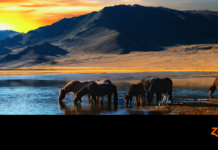Enter to Win! Click here to enter today’s giveaway. One lucky winner will get a copy of The Original Horse Bible. Enter now, because the contest closes at midnight!
2006
-
The FEI World Equestrian Games were held in Aachen, Germany,
a hotbed of equestrian activity. There were 59 countries participating in seven
different sports. Germany
didn’t need the home field advantage to continue its WEG dominance, earning 12
medals, half of them gold. The U.S.
came in second in the medal count with a total of nine. 
Click for larger imageThe 2010 WEG had been awarded to Lexington, Kentucky by 2006. Originally, part of the marketing effort was to shrink the games’ unwieldy moniker to simply “FEI Games, ” as we reported in 2006. However, the plan for a snappy title changed when Alltech stepped in as the title sponsor, adding a few syllables rather than subtracting them. It certainly worked out for the best in the long run, as Alltech’s financial backing allowed for better promotion and implementation of the event. Read more down below in the 2010 section.
2007
-
The AQHA takes a much-needed step in prohibiting foals that
test as homozygous (H/H) for the genetic disease HYPP. The Appaloosa Horse Club
will follow suit in 2008. Heterozygous horses (N/H) can still pass the disease
on to their offspring, but the AQHA is still considering restrictions against
these horses.
2008
-
Although this year’s Summer Olympics were held in Beijing, due to concerns about quarantine procedures, the
equestrian events were held hours away in Hong Kong.
Anky van Grunsven continued her streak, winning her third consecutive
individual dressage gold. Germany
won team dressage gold, just as it had at every Olympics since 1984 (West Germany
boycotted the 1980 Olympics, or else they likely would have won gold there,
too.) Germany
also dominated eventing in 2008, earning team gold and amateur rider Hinrich
Romeike—by day a dentist—took home the gold. In show jumping, Canada’s Eric
Lamaze piloted the great Hickstead to individual gold while the U.S. team, led
by bronze medalist Beezie Madden, earned team gold.Anky van Grunsven took her first individual dressage gold
with Bonfire, while silver medalist Isabell Werth led the Germans to team
dressage gold. Germany
continued to be an unstoppable force, winning show jumping team gold. Dutch
show jumper Jeroen Dubbeldam won the individual silver. The U.S. riders earned team bronze in
both eventing and dressage.
2009
- The Dutch dressage duo of Edward Gal and Moorlands Totilas made waves in the world of international dressage competition when they set the world record for the highest score ever awarded in international Grand Prix. The stunning black stallion was the subject of controversy. His fans saw him as the great savior of the sport while his detractors (namely the Netherlands’ rivals in Germany) saw his elevated movement as too flashy and artificial-looking. A year later, he was sold to a German owner and has done some competing with his new rider with relatively lukewarm results.
2010
-
The 2010 Alltech FEI World Equestrian Games in Lexington, Kentucky
were historic for many reasons. A new discipline was added: para-dressage
became the eighth sport in the WEG line-up. 2010 also marked the first year the
WEG were held outside of Europe. The financial
difficulties that had plagued some past WEG host countries were eased in part
by the games’ first title sponsor, Kentucky-based biotech company Alltech.
These games were held at the Kentucky Horse Park,
which allowed all of the sports to be held at the same venue. For the first
time in WEG history, Germany
did not come out on top in the medal count. Great Britain, the dominant player in international
para-dressage, earned 19 total medals to Germany’s
14; nine golds to Germany’s
5. American fans expected great things on home turf, but the U.S.
equestrians walked away with only three gold medas: two in reining and one
surprise team gold in vaulting. The U.S. won eight medals in total. -
2008 Olympic dressage rider Courtney King-Dye was involved
in a riding accident in March of 2010 that left her in a coma for nearly a
month. Her accident led to the creation of Riders4Helmets and other campaigns
to increase helmet use among equestrians in all disciplines.
2011
-
Protective equestrian helmets, long considered a
“personal choice” became mandatory this year for dressage and
eventing riders this year at some levels in the U.S.,
Canada and Great Britain.
Also in the U.S.,
the Morgan breed became the first breed circuit governed by the USEF to mandate
helmets specifically for leadline riders (the USEF rule book also includes a helmet rule for
Paso Fino riders aged 12 and under.) A similar rule for walk and trot riders on
the Morgan circuit is expected to take effect next year.
And Beyond…
- Many people are thoroughly convinced the the world is going to end in 2012. If they’re right, it’s OK, because that apocalypse isn’t scheduled for December, a solid three months after the equestrian events of the 2012 London Olympics.
Go back to the Horse Illustrated 35th Anniversary main page.





“Many people are thoroughly convinced the the world is going to end in 2012. If they’re right, it’s OK, because that apocalypse isn’t scheduled for December, a solid three months after the equestrian events of the 2012 London Olympics.”
HA HA! 🙂 This made me chuckle. 🙂